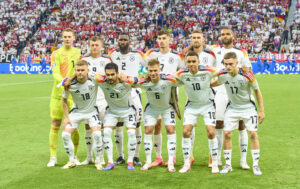The latest attempt by Europe’s top clubs to limit, if not actually eradicate, international football came earlier this week. The European Club Association, the body that represents the interests of almost all of the most successful professional clubs in Europe, announced that it wanted “mandatory rest” periods built into the footballing calendar. In addition, Andrea Agnelli, chairman of both the ECA and Italian giants Juventus, said that the organisation wanted “an overall reduction” in the number of international games that take place.
International Football Must Adapt to Survive
Of course, this is just the latest skirmish in the long-running battle between football clubs and footballing associations (both national and international) over who controls the sport. The “club v. country row” is seemingly eternal. And yet there is an absolutely obvious solution at hand.
The way to save international football is to save it for the end of the season. And that is each and every season, not just those with a continental or global tournament at the end of them. It would immediately end the interminable “club v. country” arguments. This is because players would no longer have to split themselves between representing club or country during the season. Instead, they would play solely for their club for the bulk of the season. Then, at season’s end, join up with their respective national teams.
Ending International Breaks?
Perhaps the biggest gripe over international football is that it gets in the way of regular club matches. It is not just club chairmen or owners who feel like that. If anything, club fans are even more vocal about what they regard as “interruptions” to their beloved club’s matches. In England, for example, the term “international break” has almost become one of abuse. The suggestion being that it is a “break” from proper (i.e. club) football.
By scheduling all international games at the end of the season, club v. country arguments would cease. Instead, it would be quite clear who had control over individual players at different times of the season and there would be no more major interruptions to clubs’ schedules. The club season could end in April as there would no longer be so many “interruptions” for international football.
Issue of Player Access
Of course, such a major revision of the footballing calendar is not easily achievable. One problem being that international managers would complain about lack of access to players until the end of a season. And yet that is largely the reality now. International managers only ever know which players will actually be available for a tournament at the end of the domestic club season.
Even the most successful international managers have admitted that most of the work they did with their sides was crammed into the few weeks before a tournament began. For example, Mario Zagallo was only made the Brazilian manager in 1970 just a few months before the World Cup began. This is due to the country’s ruling junta deciding João Saldanha was not up to the job. They reached the decision despite the fact he had led Brazil to a perfect record in qualifying.
Qualifying matches are the other obvious problem when it comes to contemplating a dramatic revision of the footballing calendar. However, it is not an insurmountable one. Qualifying games could be played in one or two discrete “blocks” throughout the season. With one, say, in mid-October or early November and one in mid-February or early March. Alternatively, a qualifying campaign could be completed within a single calendar year. Then, in the following year, the only international football would be the actual tournament that the country had qualified for and the warm-up games beforehand.
For Club and Country
There is another obvious benefit to redrawing the traditional football calendar. That is, international managers would no longer need to be free from the shackles of club management. Instead, top managers would oversee their club side during the season and oversee their national sides at the season-ending tournaments. Imagine a Portugal being managed by Jose Mourinho taking on a Spain side managed by Pep Guardiola? That is a mouthwatering prospect, as the best managers would no longer just be “pundits” at major tournaments but participants.
There are other difficulties in saving international football for the end of the season. Another obvious one is the current scheduling of some continental championships. Africa’s Cup of Nations, for example, takes place in January rather than the summer. This is due to the fact that summer months in Africa are too hot for international football.
However, the real danger for international football is the danger of doing nothing. Already, it is being marginalised by the rise of the club game and in particular the ascent of the so-called “Superclubs”, such as Real, Barca and Bayern. They can boast truly global fan bases larger than those of any national side. That includes even the most successful national teams such as Germany or Brazil.
Changes Already Coming
That process will only intensify in the future, given the location of the next two major tournaments for European sides. First, the Europe-wide “Euro 2020” promises to be a real dog’s breakfast of a tournament in the absence of a single host country. The Qatari World Cup in 2022 will then, of course, occur in autumn rather than in summer. As a result, it will really impact on club football, not just for one season but several.
After those tournaments, many fans might join Signor Agnelli in calling for an “overall reduction” in international football. So, compared with the possible slow demise of the international game, merely relocating it to the end of the season is a small sacrifice to make.
Main Image Credit:
Embed from Getty Images






